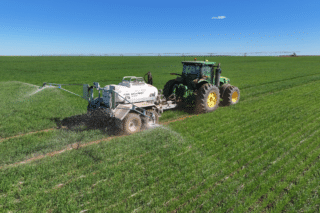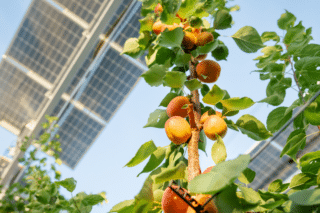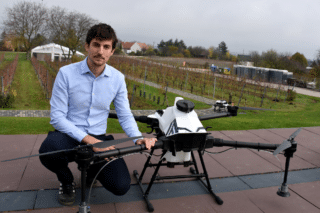From connected cows to vegetables that stay fresh for weeks, Fujitsu is developing a cloud-based platform that uses IoT technology to increase efficiency and modernize agriculture.
Agriculture used to be guesswork. Once crops were sown, fertilizer was spread and fingers were crossed for a good harvest. Cue the smart farm. By enlisting new technology, including sensors, the cloud and big data analytics, the agriculture sector is trying to increase efficiency and yields. For now, it’s mostly experimental. But one standout test project from Japan is showing how the smart farm can bring vital predictability to agriculture.
Food Cloud
Fujitsu has been producing low-potassium lettuce since 2014, a crop which grows quickly and stays fresh for weeks. The food and agriculture cloud project in Fukushima Prefecture, dubbed Akisai, is housed in the company’s 2,000 m² former semiconductor plant that was converted into a vast greenhouse. Inside, sensors measure soil temperature, humidity and light levels to ensure ideal growing conditions, and send environmental data to the cloud in real time.
The goal is to create consistent, predictable conditions for the lettuce in order to increase yields, explains Rishad Marquardt, Fujitsu spokesperson.
“Akisai is a cloud-based platform that utilizes information and communication technology to increase efficiencies across a variety of areas in the agricultural industry. One way in which Akisai has been utilized is in the production of low-potassium lettuce that can last for several weeks and still remain perfectly fresh. It tastes great, without the bitter taste that regular lettuce usually has, and can also be eaten raw by dialysis patients and people with chronic kidney disease.”
Because there are no agri-chemicals and few microbes present on the crop, it doesn’t even need washing before being eaten. Each crop takes about four weeks from seeding to shipping, and Fujitsu can manage each stage of the process remotely.
Sensors Determine Production
Networked sensors inside the greenhouse exchange information—soil temperature, humidity, light levels—via software on the cloud to determine the best conditions for production. Calculations in the cloud precisely control the atmosphere and even regulate the active ingredients included in liquid fertilizers. System analyses are performed by Microsoft’s Azure cloud computing platform, which is also used by GE, Boeing and BMW.
Through the cloud, the closed cultivation area can be monitored remotely and automatically. For example, the calculations performed by cloud software analyzing sunlight and temperature levels activate curtains and fans.
Procedures are also influenced by machine learning. This type of artificial intelligence enables computers to learn without being explicitly programmed. In this case, yields from one crop inform how the next crop is nurtured by the cloud-based software, without any human intervention.
For the moment, the sensors in this test plant are wired, but if Akisai is to work on large-scale farms, wireless wide-area networks will be necessary.
Connected Cows
The Akisai cloud is also being used for animal husbandry. In the Gyuho program, pedometers are attached to cows’ legs in Japan and elsewhere to help ranchers better assess breeding receptivity. Program sites include South Korea, Finland, the UK, Turkey and Poland. Julita Bilska, Projects Co-ordinator at Fujitsu Poland, talks about these connected cows:
“Cows walk more when they are in estrus, so the system helps to detect how much they walk. Normally, the farmer cannot judge visually when cows are ready for artificial insemination.”
The data from each cow are sent from the pedometer to a receiver, then to the Akisai cloud.
“It’s very accurate and the data are analyzed in real-time, so the farmers know the exact time to call the vet. It’s a very short window.”
Exporting Akisai: Guidance Via the Cloud
The initial success of Akisai has seen it spread to other countries, including Vietnam and Turkey, though for now it’s just for greenhouses. In Vietnam, two Akisai Farm and Vegetable Factories opened in February 2016 near Hanoi, with the goal of combating pesticide overuse in tomato farming. Here, the concept of remote cultivation guidance comes into play.
Engineers and agricultural experts in Japan can offer advice from afar since all the crop data is on the cloud. This is part of Fujitsu’s Akisai Greenhouse Horticulture SaaS (software as a service), which it hopes to roll out globally. Smart agriculture seems poised to grow.













